Scroll down for more
Retaining Tomorrow's Supply Chain Leaders: What Gen Z and Millennials Want
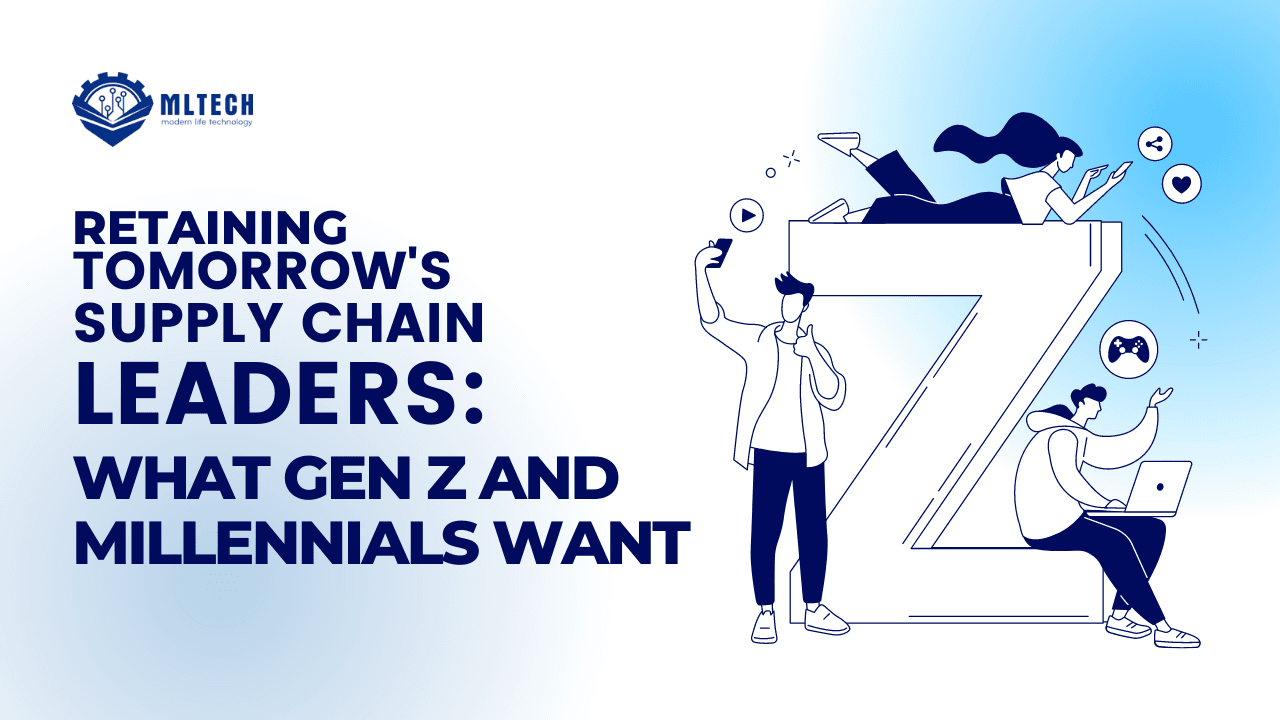
Generation Z and Millennials
Generation Z and Millennials are the country's most powerful future generations and the primary source of economic progress. As a generation born and raised in the Internet age, Gen Z and Millennials are accustomed to gathering and referencing various sources of information at the same time, merging virtual and real experiences.
Retaining Gen Z and Millennial supply chain talent
With the rise of the young labor force, businesses of all sizes and sectors are attracting, selecting, and retaining excellent, dynamic, and innovative Gen Z and Millennials. To keep up with the development changes, the supply chain business does the same.
Retaining Gen Z and Millennial supply chain personnel, on the other hand, can be challenging because these generations have different values and expectations than earlier generations in the workforce.

What motivates these workers to remain engaged and committed to their roles?
Pushing Gen Z and Millennials to be engaged and committed to their roles in the supply chain industry requires companies to understand their motivations in their jobs.
Because Gen Z and Millennials are generations with different values and expectations than previous generations, if companies do not recognize them, they can lose their young talent to competitors.
Millennials and Gen Z prioritize job satisfaction, work-life balance, and personal growth and development over salary and job stability. They want to work for companies that align with their values and provide opportunities to learn and grow professionally. They also value positive company culture, diversity and inclusion, and work environments that apply technology and innovation.
Companies that realize these motivations early can retain young talent in the supply chain industry. When kept successful, these employees will engage in and commit more to their roles with more productive, innovative, and loyal attitudes, which leads to improved organizational performance and profitability.
Key takeaways for retaining tomorrow's supply chain leaders
Understanding the importance of dynamics in retaining Gen Z talent and Millennials in the supply chain industry is extremely important.
With a fresh perspective and an open mind, this generation will often focus on some key career points, including prioritizing job satisfaction, work-life balance, and personal growth and development rather than salary and job stability.
With an environment that meets all of the above points, retaining them to stay and continue to work won't be a complex problem for companies in general and supply chains in particular.
The Characteristics and Expectations of Gen Z and Millennial Workers
Discuss the unique characteristics and values of Gen Z and Millennial workers that impact their career choices and job satisfaction
Gen Z and Millennials have a variety of distinctive qualities and values that can influence their career choices and job satisfaction because they are the youngest generation with open-minded attitudes and the latest approaches to the Internet.
Some of their unique characteristics and values we can mention involve:
-
Open-minded thoughts: Millennials and Gen Z are ready to accept and face strong job risks and know how to find innovative ways and solutions to problems.
-
Collaborative mindset: Younger workers are more collaborative in their work style, preferring to work in groups and share ideas with coworkers. They value open communication and feedback and are frequently at ease in a more informal and flexible work environment.
-
Career changes: Millennials and Gen Z are more willing than earlier generations to change occupations and careers. They value personal development and are willing to change occupations if they believe they are not growing or developing in their current position.
-
The desire for feedback: Younger workers value feedback and receive it regularly. They want to know how they are doing, what they can improve, and what growth and advancement opportunities are.
-
Passionate about technology: These are generations born with access to technology in many different forms, so they will always be curious and want to conquer technology to a certain extent. Therefore, they will always want to find a job that applies many technologies to improve work efficiency as well as satisfy curiosity.
How do these characteristics and values influence their expectations of the workplace?
These characteristics and values result in the expectations that Millennials and Gen Z are expected to have in the workplace. Some of the typical expectations we can list as examples are:
-
Work-life balance: Work-life balance is more important to both generations than a high wage or professional reputation. They choose positions that offer flexible work schedules, time off for personal obligations, and a manageable workload.
-
Flexible schedules: They value flexible schedules because they value work-life balance and the healthy integration of work and personal life. They want the flexibility to change their work hours or work remotely, which will allow them to manage other obligations and reduce stress. This is particularly crucial in the supply chain industry, where unforeseen delays or critical concerns may emerge, requiring employees' availability outside of typical work hours.
-
The use of technology: Gen Z and Millennial workers have grown up with technology, so they have a high level of comfort and proficiency with technology and expect it to be a part of their work experience.
In the supply chain industry, technology can be used not only to streamline processes, and increase efficiencies, such as inventory management, and order processing; but also to improve communication through video conferencing, instant messaging, and collaboration tools.
How can companies adapt to these expectations and create a positive work environment for these workers?
Understanding their expectations in the workplace, companies can adjust in the following ways to create a positive work environment for Gen Z and Millennial workers:
- Provide growth opportunities: Training programs, mentorship, and leadership development should be provided by companies as possibilities for growth and development. This can make younger employees feel appreciated and invested in their careers, encouraging them to stay with the company in the longer term.
- Embrace technology: Younger workers are more comfortable with technology and expect to work in a technologically advanced setting. To improve communication, cooperation, and productivity, businesses should prioritize the use of current technologies and processes.
-
Promote work-life balance: By offering flexible work arrangements, such as remote work or flexible scheduling, companies can help employees manage their personal and professional commitments.
-
Foster a positive company culture: A positive culture at work that encourages teamwork, open communication, and employee well-being can help to retain young talent. Companies can accomplish this by encouraging employee feedback and input and recognizing and rewarding employees' efforts.
Career Development Opportunities
The importance of career development opportunities in retaining supply chain talent
Career development opportunities are crucial for retaining supply chain talent, particularly for Gen Z and Millennial laborers who prioritize personal growth and development in their careers. Here are some reasons why career development is so important:
-
Employee satisfaction and engagement: When employees believe their company is invested in their professional development, they are more likely to be devoted, dedicated, and productive at work.
-
Retention: Career development possibilities can also aid in the retention of employees, particularly young people who seek organizations that provide a path for advancement.
-
Improve skills: Career development programs are designed to help employees learn new skills and gain experience in various sectors of the supply chain business. This can increase their value to the firm and lead to greater creativity and competitiveness.
-
Promotion plan: Career development programs contribute to organizations in planning for the future by recognizing potential leaders and preparing them for more senior responsibilities. This can help the business maintain a solid pool of talent to fill important positions when they become available.
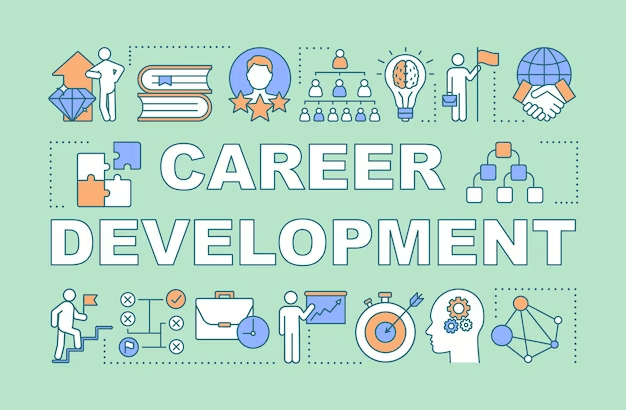
Examples of career development opportunities that are relevant to the supply chain industry
Career development opportunities are important in keeping talent in most firms; thus, here are some examples of supply chain-related career development options:
-
Mentorship programs: Mentorship programs are a beneficial way for employees to learn from experienced supply chain experts. These programs can offer guidance on career paths, insights into the industry, and opportunity to network with other experts.
-
Cross-functional training: Cross-functional training can expose employees to several aspects of the supply chain business, including logistics, procurement, and manufacturing. Employees get a deeper grasp of the sector as well as new abilities that they can apply to their present or future employment.
-
Leadership development programs: These programs can assist employees in developing the skills and knowledge required to become effective leaders in the supply chain business. These programs may involve communication, team-building, and problem-solving training, as well as possibilities for company leadership.
These are just a few examples of the various career paths accessible in the supply chain business. Companies may assist employees to grow and develop in their careers by giving them these chances, and they also generate a solid pool of talent for the future.
How do we effectively communicate these opportunities to Gen Z and Millennial workers?
What if the company has career development opportunities but does not know how to communicate effectively with Gen Z and Millennial workers in the supply chain industry? And here are a few ways the company can refer:
-
Use multiple channels: Workers in Generation Z and Millennials are technological experts who seek to acquire information through numerous channels. Companies could explore communicating professional development possibilities through a range of channels, such as email, social media, and internal communication platforms.
-
Highlight benefits: When communicating career growth options, it is critical to emphasize the rewards that these chances can give, as this motivates them in their work.
-
Make it clear: By using videos, infographics, and other visual components to communicate career development possibilities, companies can deliver the content of these career growth opportunities attractively and interestingly.
-
Make it continuous: This can involve providing staff with regular updates on new training programs, conferences, and other opportunities that are relevant to their career aspirations, which keeps employees engaged and motivated.
Inclusivity and Diversity
The importance of inclusivity and diversity in retaining supply chain talent
Inclusivity and diversity are becoming increasingly essential to Generation Z and Millennial workers, who appreciate workplaces that welcome and include people of different backgrounds and identities. This is a range of factors like color, gender, sexual orientation, age, religion, and ability.
Inclusivity and diversity are more and more essential for retaining supply chain talent for several reasons:
-
Foster a culture of respect and acceptance: When an organization supports and celebrates diversity, a culture of respect and acceptance is created. Employees feel valued and included, which leads to higher job satisfaction and dedication.
-
Encourage innovation: Workplace diversity brings together people with diverse backgrounds, experiences, and opinions. This variety can foster innovation and creativity, resulting in fresh ideas and solutions to business problems.
-
Inclusive workplaces encourage collaboration and teamwork. Employees who feel included and respected are more likely to collaborate effectively, resulting in more productivity and better commercial outcomes.
-
Improve talent recruitment and retention: Being appreciated and included, employees are more likely to continue working and recommend the organization to others.
-
Reflect the requirements of various customers and stakeholders: A diverse and inclusive staff ensures that the organization can meet the requirements and expectations of these various groups well.
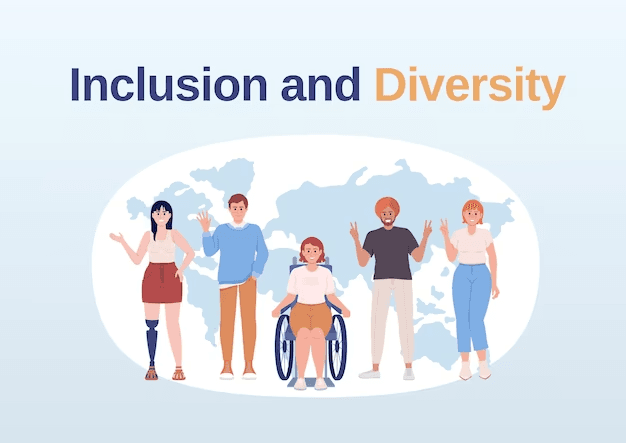
Examples of how companies can create a more inclusive and diverse work environment
Companies in the supply chain industry should prioritize initiatives to create a more inclusive and diverse work environment, such as:
-
Unconscious bias training: Unconscious bias training can be provided by businesses to help Employees become aware of their biases and learn approaches to overcome them. By minimizing discriminatory behaviors and promoting a culture of respect and acceptance, this training can assist to build a more inclusive workplace.
-
Employee resource groups (EGRs): This provides an opportunity for employees who have common identities or experiences to address problems that are important to them , network, and push for more diversity and inclusion in the workplace.
-
Diversity and inclusion metrics: This enables businesses to track their success and identify areas for improvement. This includes gathering demographic information on employees, conducting regular surveys and focus groups, and assessing the diversity of leadership positions.
How do we effectively communicate company's commitment to Gen Z and Millennial workers?
Enterprises can create a more engaged and devoted workforce by effectively conveying the company's commitment to inclusivity and diversity to Gen Z and Millennial employees in some effective ways:
-
Be transparent: Gen Z and Millennial workers value transparency and authenticity. Be open and honest about your company's position on diversity and inclusion, as well as the efforts you're taking to improve. To indicate progress, share data and measurements.
-
Use social media: Because Gen Z and Millennial workers are active on social media, use these channels to communicate your commitment to diversity and inclusion. Share tales of diverse personnel, as well as company events and diversity efforts.
-
Collaboration with external organizations: Collaborate with external organizations, such as professional associations or community groups, that promote diversity and inclusion in the supply chain industry.
-
Provide training: Provide training on unconscious bias, cultural competency, and other subjects relating to diversity and inclusion to all employees, particularly supervisors. This training can serve to make the workplace more inclusive and highlight the company's commitment to these concerns.
Technology and Innovation
Technology and innovation in retaining Gen Z and Millennial supply chain talent
Technology and innovation play a critical role in retaining Gen Z and Millennial supply chain talent because they have grown up with technology and are comfortable using it in their personal and professional lives.
Technology drives innovation: Workers in Generation Z and Millennials respect innovation and are attracted to organizations that use modern technologies to create change.
Aside from that, they seek to employ technology to address the need for remote working. They enable remote work and schedule flexibility and boost job satisfaction by making work more exciting and gratifying.
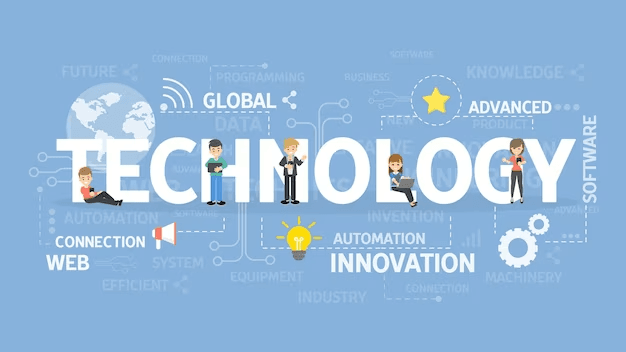
How can companies leverage technology and innovation to improve supply chain operations? Because technology is such a key aspect in attracting and retaining personnel, supply chain organizations that wish to compete must enhance their technology in the following ways:
-
Using blockchain for supply chain traceability: Blockchain technology can be used by enterprises to generate a secure and transparent record of every transaction in the supply chain. This provides visibility throughout the whole supply chain, allowing businesses to trace the origin of items and verify regulatory compliance.
-
Adopting AI and machine learning for supply chain forecasting and optimization: Companies can utilize AI and machine learning algorithms to estimate demand and manage supply chain operations by analyzing data from many sources such as weather data, social media, and sales data.
-
Implementing sustainability initiatives: Companies can leverage technology and innovation to undertake supply chain sustainability initiatives such as using renewable energy sources, minimizing waste and emissions, and using environmentally friendly materials.
Companies may improve supply chain operations, cut costs, and increase sustainability by leveraging technology and innovation in these and other ways, while also recruiting and retaining top talent in the Gen Z and Millennial workforce who value these projects.
How do we effectively communicate company's investment in technology and innovation to Gen Z and Millennial workers?
Consider the following ways to effectively communicate your company's investment in technology and innovation to Gen Z and Millennial employees:
-
Use social media to post updates about your company's technology investments: Gen Z and Millennial workers are active on social media, and using these platforms to share updates about your company's technology efforts can assist to attract their attention.
-
Highlight sustainability activities: Highlight programs such as renewable energy, environmentally friendly materials, and waste reduction, and explain how technology makes these initiatives practical.
-
Promote innovation: Because Gen Z and Millennial workers respect innovation, share success stories and instances of how technology is enabling your organization to address supply chain difficulties and improve operations.
-
Provide opportunities for training and development: Provide opportunities for training and development so that they can learn new skills and stay up to date on the newest technological developments.
Companies may use such approaches to effectively communicate their investment in technology and innovation to Gen Z and Millennial employees, as well as to attract and retain top talent in this competitive workforce.
Compensation and benefits in retaining supply chain talent
Competitive compensation and benefits are critical factors in retaining supply chain talent. Supply chain talent is in high demand, and companies must offer competitive compensation packages in order to attract and retain top talent. This includes not only base salaries, but also bonuses and a comprehensive benefits package that meets the needs of their workforce.
By offering competitive compensation and benefits, companies will have more opportunity to hire supply chain talent to contribute to the development later.
Compensation and benefits packages that are relevant to the supply chain industry
As mentioned before, there are many compensation and benefits packages related to the supply chain business that can assist organizations in attracting and retaining top talent. Here are a handful of such examples:
-
Flexible work arrangements: Supply chain workers frequently work long hours and may need to be available outside of typical office hours. Allowing employees to work from home or change their schedules, for example, can help them better manage their work-life balance.
-
Wellness programs: Supply chain employees may undertake a great deal of anxiety and stress, which can lead to burnout and other health issues. Employees' health and well-being can be improved by providing wellness programs such as gym memberships, mental health resources, and stress management training.
-
Retirement savings plans: Many supply chain professionals are concerned about their long-term financial security. Employees might feel more financially secure and invested in their long-term future if their employers provide retirement savings plans, matching contributions, and financial planning resources.
Companies may build a comprehensive package that satisfies the demands of their workforce and helps recruit and keep top personnel in the competitive supply chain business by offering a combination of these compensation and benefits packages.

How do we effectively communicate company's compensation and benefit packages to Gen Z and Millennial workers?
Because Gen Z and Millennial employees have some distinguishing qualities, it is critical to highlight the distinguishing features of the compensation and perk packages that are most relevant to these generations.
-
Emphasize flexibility: Work-life balance and flexibility in work arrangements are crucial for Generation Z and Millennial employees. Highlight any flexible work arrangements or policies that they believe are appropriate.
-
Emphasize wellness: Wellness is important to Gen Z and Millennial workers, so make sure to emphasize any wellness programs or initiatives the company offers to ensure their health.
-
Use clear and concise language: Avoid using jargon or technical phrases, and instead use basic and straightforward language and visuals to effectively convey the pay and benefits packages.
Overall, effective communication of compensation and benefits packages to Gen Z and Millennial workers involves understanding their unique preferences and priorities, as well as their motivations.
Retaining Tomorrow's Supply Chain Leaders
Summarize the best practices for retaining Gen Z and Millennial supply chain talent
After providing a lot of ways to retain Gen Z and Millennial supply chain talent, we can summarize the best practices that companies should focus on:
-
Offering career development opportunities, such as mentorship programs, cross-functional training, and leadership development programs.
-
Fostering a culture of inclusivity and diversity, through initiatives like unconscious bias training, employee resource groups, and diversity and inclusion metrics.
-
Embracing technology and innovation, by leveraging tools like blockchain for supply chain traceability, AI and machine learning for forecasting and optimization, and sustainability initiatives.
-
Offering competitive compensation and benefits packages, including flexible work arrangements, wellness programs, and retirement savings plans.
Companies can establish a good work environment that encourages and engages Gen Z and Millennial employees while also enhancing supply chain operations and driving commercial success by implementing these best practices.
Tips for implementing these practices in the supply chain industry
Without the following guidelines, it will take supply chain managers a long time to establish the best practices for keeping Gen Z and Millennial supply chain talent:
-
Conduct survey: This enables supply chain managers to comprehend the distinct needs and preferences of Generation Z and the Millennial workforce.
-
Create and promote a clear professional development path for employees, which may include mentorship programs, job rotations, and leadership development activities.
-
Develop an inclusive and diverse culture through training, employee resource groups, and metrics that track progress toward goals.
-
Use technology and innovation to optimize supply chain operations, improve sustainability programs, and give staff opportunities to develop new skills.
-
Create a competitive wage and benefit package that reflects Gen Z and Millennial workers' beliefs and expectations.
-
Using means that are relevant and accessible to these generations, including social media and mobile apps to communicate these practices and possibilities to Gen Z and Millennial employees effectively.
By applying these ideas, supply chain firms may establish a work environment that attracts and maintains the best talent while also driving business success and enhancing supply chain operations.
Prioritize talent retention in the supply chain operations, and provide resources for further reading and learning
Supply chain leaders should pay more attention to and prioritize talent retention in their operations. However, this is a long process to establish, implement, and improve everything, so they must research, discuss, and refer to information from a lot of sources to make wise decisions.
One useful resource they cannot miss is reading and learning. Some of the following books about retaining Gen Z and Millennial supply chain talent can be used as references:
-
"How to Attract and Retain Millennials in the Supply Chain Workforce" by Supply Chain Dive
-
"5 Strategies for Recruiting and Retaining Millennial and Gen Z Talent" by Gartner
-
"The Rise of Gen Z in Supply Chain Management" by IndustryWeek
-
"The Importance of a Strong Supply Chain Talent Pipeline" by Harvard Business Review
-
"The New Supply Chain Mandate: Be More Engaging" by EY

To summarize, maintaining tomorrow's supply chain leaders requires a grasp of what inspires and engages Generation Z and Millennial workers. These generations have different attitudes and demands than earlier generations, and firms must adapt to these changes in order to retain top personnel.
Investing in personnel retention is critical in the supply chain industry for developing a strong and engaged workforce capable of driving company success and improving supply chain operations. Companies can establish a culture of innovation and excellence that attracts and keeps the best people in the business by prioritizing talent retention.
Content
Get our blog
Want the latest and greatest from our blog straight to your inbox? Chunk us your details and get a sweet weekly email.
Read more in our blog

Project Management
The Impact of Dynamic Pricing on Customer BehaviorExplore the impact of dynamic pricing on customer behavior and learn how to implement effective pricing strategies.
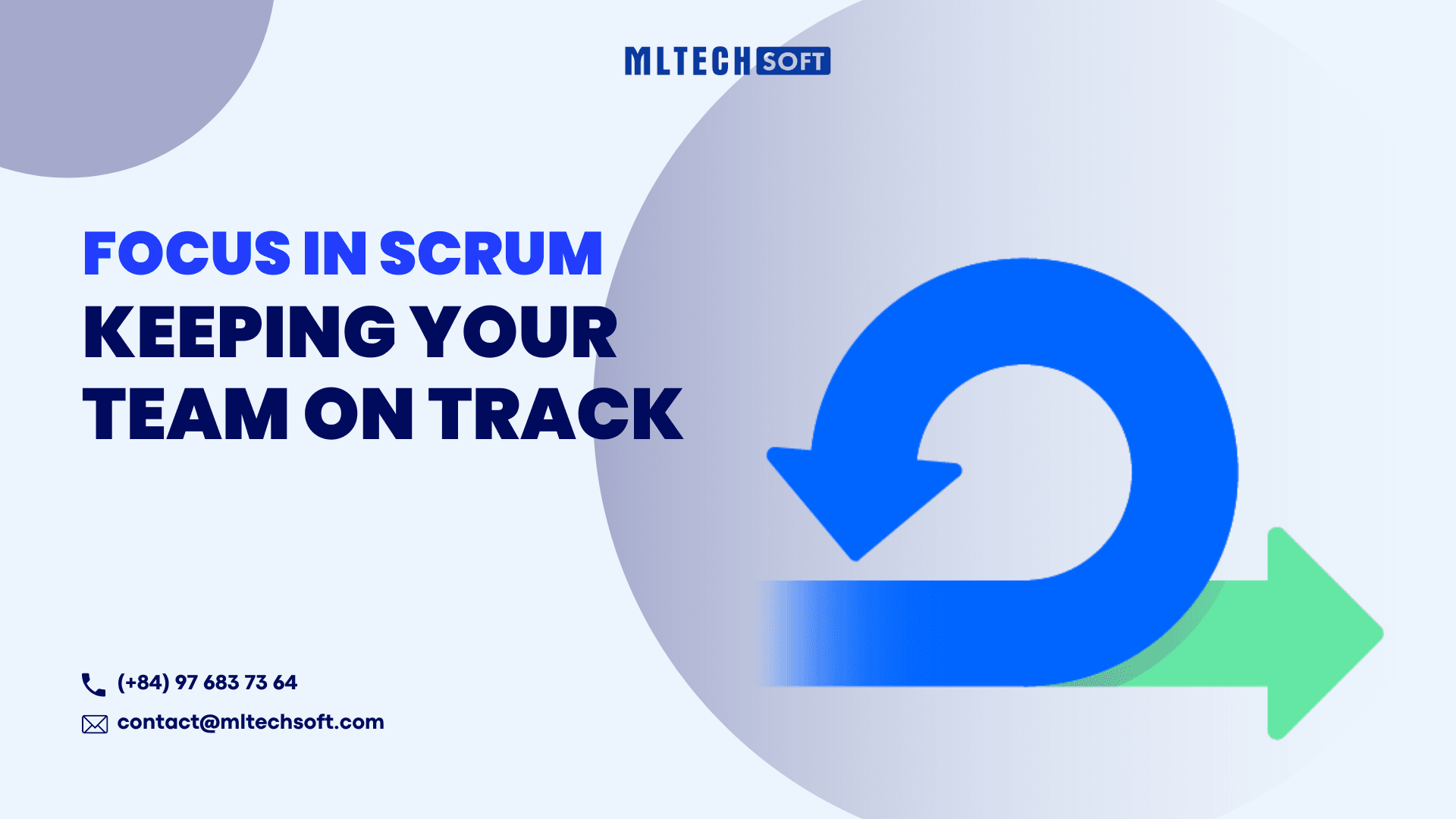
Project Management
Focus in Scrum: Keeping Your Team on TrackDiscover effective strategies to maintain focus within your Scrum team, overcome common challenges, and boost productivity.

Project Management
Key Metrics for Mobile App SuccessDiscover the essential metrics for mobile app success, from user acquisition and engagement to monetization and performance.
MLTECH SOFT